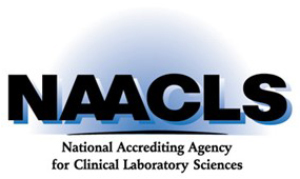What is a Medical Laboratory Scientist (Medical Technologist)?
As a valued member of the health care team, the medical laboratory scientist uses advanced technology to perform analyses on blood and other body fluids to aid in detecting and/or treating disease. Working closely with physicians and other allied health professionals, the medical laboratory scientist (often called a medical technologist) plays an integral role in comprehensive patient care by providing accurate and timely results. Graduates of a medical laboratory science training program have a firm foundation enabling them to work in the medical laboratory and pursue graduate study for many advanced or alternate career paths.
Program Overview
Undergraduate Program
The Medical Laboratory Science Program at St. Christopher's Hospital for Children cooperates with area colleges and universities in offering the clinical year of a four-year program leading to the Bachelor of Science degree in Medical Laboratory Science.
During the first three years, the student follows a course of study concentrating on biology and chemistry at the college where the student is matriculated. In the fourth year, all courses are held at St. Christopher's Hospital for Children and various medical laboratory sites in the Philadelphia metropolitan area.
To fulfill their clinical and academic requirements within 10 months, students spend two months in didactic instruction with the remainder of time spent as follows: Mondays in the classroom and Tuesdays - Fridays in their medical laboratory rotations. The academic year begins in late August and typically ends in late June.
Undergraduate College Affiliates
The program accepts students from various colleges but is affiliated with the following institutions:
- Bloomsburg University
- East Stroudsburg University
- Gwynedd-Mercy University
- Holy Family University
- Indiana University of Pennsylvania
- Saint Francis University
- Saint Joseph's University
- Slippery Rock University
- West Chester University
- Wilkes University
- York College of Pennsylvania
Post Baccalaureate Program
Enrollment in the Medical Laboratory Science Program is not limited to undergraduates. Individuals with Bachelor's degrees and Medical Laboratory Technicians who wish to advance to the Medical Laboratory Science level are also accepted based on their qualifications and mandatory prerequisites. Individuals with Bachelor's degrees who have already taken the courses required by the certification agencies are typically required to take only the courses given during the clinical year at the hospital.
Curriculum
The curriculum is designed to give the student a thorough background in the performance, interpretation and application of medical laboratory procedures. Equally important is the emphasis placed on correlation of test results with pathologic conditions of patients.
The four major areas of the hospital laboratory are:
- Microbiology
- Clinical Chemistry
- Hematology
- Immunohematology (Blood Bank)
Upon completion of the internship year, the individual will be proficient in each of these four areas. Students will also be introduced to the clinical disciplines of Urinalysis, Immunology/Serology, Point-of-Care Testing, Cytogenetics, Virology, Respiratory Therapy, HLA, and Molecular Diagnostics. In addition, students are exposed to the basics of health care management, education, research and computer skills, which are applicable to career advancement and/or graduate school.
National Certification
Upon completion of the program and all other college requirements, the student is eligible to receive a bachelor's degree. This is conferred by the college at which the student is enrolled. The student is then eligible to take the nationally administered certification examination to become a credentialed Medical Laboratory Scientist - MLS (ASCP).
Clinical Rotation Sites & Affiliates
Clinical rotations will be performed at St. Christopher's Hospital for Children, Capital Health Medical Center, Temple University Hospital, and the Philadelphia Department of Public Health Laboratory. These rotations will provide a broader experience for the students and enhance their understanding of the profession of medical laboratory science (medical technology) in both pediatric and adult populations.
Program Outcomes
| Year | Graduation Rate | Certification Rate | Job Placement Rate |
|---|---|---|---|
| Class of 2014 | 100% | 100% | 100% |
| Class of 2015 | 100% | 71% | 100% |
| Class of 2016 | 100% | 88% | 100% |
| Class of 2017 | 88% | 100% | 100% |
| Class of 2018 | 100% | 88% | 100% |
| Class of 2019 | 100% | 100% | 100% |
| Class of 2020 | 100% | 71% | 100% |
| Class of 2021 | 100% | 80% | 100% |
| Class of 2022 | 100% | 87.5% | 100% |
| Class of 2023 | 100% | 87.5% | 100% |
| Class of 2024 | 90% | 66.7% | 88% |
| Class of 2025 | 100% | 100% | 100% |
Please contact the program director with inquiries. The Medical Laboratory Science Academic Handbook is available upon request.
Ethan Kentzel, MS, MLS (ASCP)
MLS Program DirectorEmail: SCHCMLSProgram@towerhealth.org
Phone: 215-427-5306
Mailing Address:
School of Medical Laboratory Science
St. Christopher's Hospital for Children
160 East Erie Avenue
Philadelphia, PA 19134


